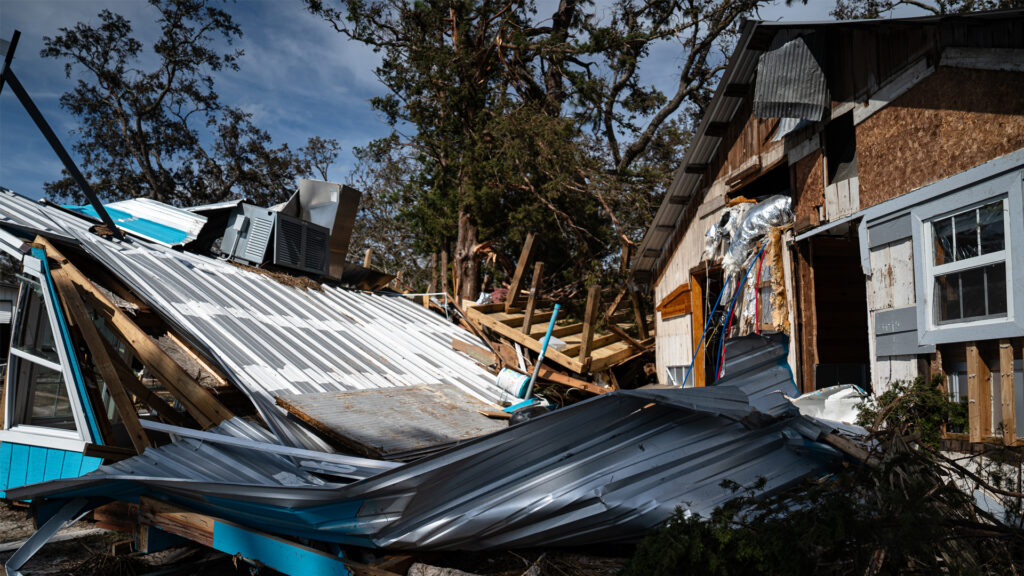By Robert F. Sanchez, Right to the Point
Watching Tuesday’s vice-presidential debate to see if former President Donald Trump was correct when he warned that it would be “rigged” was the last thing on the minds of millions of Americans this week as they tried to cope with Hurricane Helene’s aftermath.
This massive storm caused hundreds of deaths, inflicted an estimated $160 billion in property damage, and left millions without power in a vast region of the southeast, with most of the deaths and property damage attributable to flooding.
Florida’s capital — the command center for the state’s response — was spared from the horrific disaster that many residents had anticipated. Forecasts of the storm’s path led it straight to Tallahassee, a city set amid a forest of vine-draped trees overhanging the power lines of the city-owned utility.
Foreboding banner headlines atop the front page of the city’s daily newspaper warned “POTENTIALLY CATASTROPHIC” on Wednesday and “NIGHTMARE SCENARIO” on Thursday, the morning of the day when Helene was due to hit.

The storm had formed near Mexico’s Yucatan peninsula and moved steadily north in the Gulf on a path roughly parallel to Florida’s west coast, causing widespread storm surge damage. It was a reminder of the risks of building — and repeatedly rebuilding — expensive structures close to the shore in an era when climate change is expected to spawn storms that are more frequent and more severe.
Just prior to landfall the storm veered eastward and came ashore in Taylor County, which had been smacked by major Hurricane Idalia in August a year ago and impacted again earlier this year by Hurricane Debbie.
It would be hard to find a less-populated stretch of oceanfront anywhere in Florida. Slightly more than 50,000 residents inhabit the three coastal counties — Taylor, Jefferson and Dixie — that bore the brunt of Helene. In Florida’s capital county, Leon, the population exceeds 300,000, so a direct hit would’ve been much costlier.
Thanks to the storm’s shift in direction, Florida’s struggling property insurance companies, including Citizens Property Insurance, the state-owned “insurer of last resort,” could breathe a sigh of relief.
The insurers’ relief may have been short-lived, however. On Sunday, CBS’ “60 Minutes” handed them a different kind of disaster, inflicting damage on the industry’s carefully cultivated image as a helpful presence when disasters occur.
In what some have described as a hit piece, the program blamed insurance companies for delaying and/or pushing back on some of the claims for damage that occurred two years ago, when Hurricane Ian hit Southwest Florida.
As for the current widespread devastation in northern Georgia, the Carolinas and Tennessee, property insurance companies are mostly off the hook because their policies typically exclude flood damage.

This will shift attention to the federal government’s financially stressed flood insurance program. While mortgage lenders require property owners in areas deemed vulnerable to flooding to carry this kind of insurance, much of the region ravaged by Helene is not within the flood zones.
As a result, thousands of residents who lost everything will be looking for help from FEMA — the Federal Emergency Management Agency. Like the feds’ flood insurance program, FEMA has been increasingly challenged to respond to natural disasters ranging from wildfires in the west to coastal area hurricanes.
Worse, this added financial stress comes at a time when the federal government is awash in a veritable flood of its own — a deluge of red ink caused by nonstop deficit spending that’s adding to a national debt that recently hurtled past $35.3 trillion.
It’s a looming fiscal crisis that neither Donald Trump nor Kamala Harris has made an issue on the campaign trail, much less offered a credible solution. So, as the costs of multiple natural disasters continue to pile up, don’t expect Uncle Sam to keep coming to your rescue. Indeed, if this irresponsible pattern of behavior continues, he may well be broke.
Robert F. Sanchez, of Tallahassee, is a former member of the Miami Herald Editorial Board. He writes for the Herald’s conservative opinion newsletter (miamiherald.com/righttothepoint). This opinion piece was originally published by the Miami Herald, which is a media partner of The Invading Sea.
If you are interested in submitting an opinion piece to The Invading Sea, email Editor Nathan Crabbe at ncrabbe@fau.edu. Sign up for The Invading Sea newsletter by visiting here.



